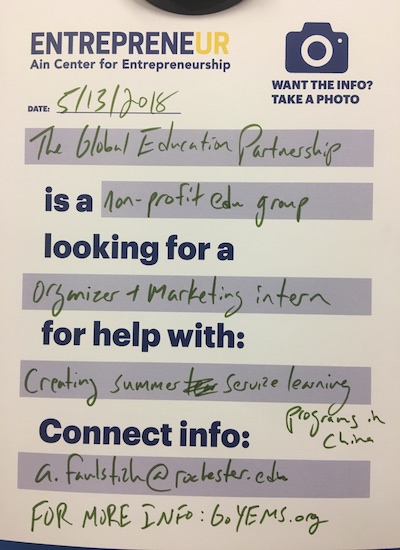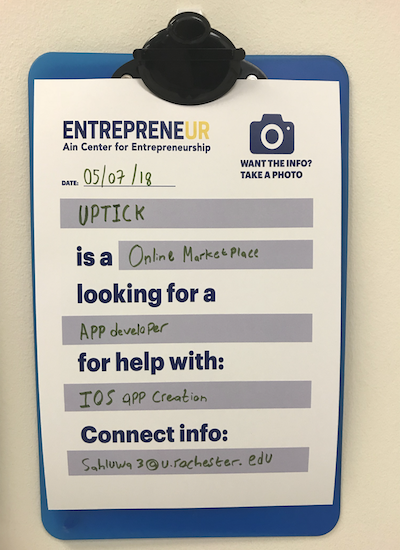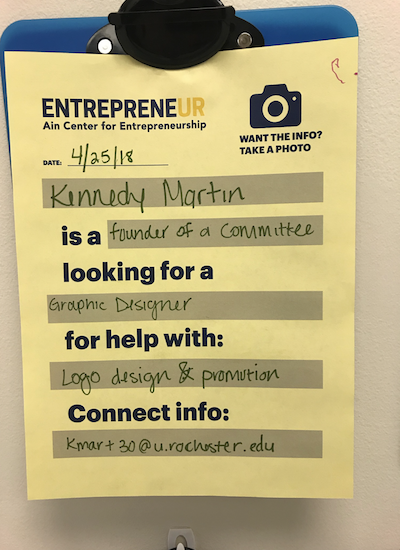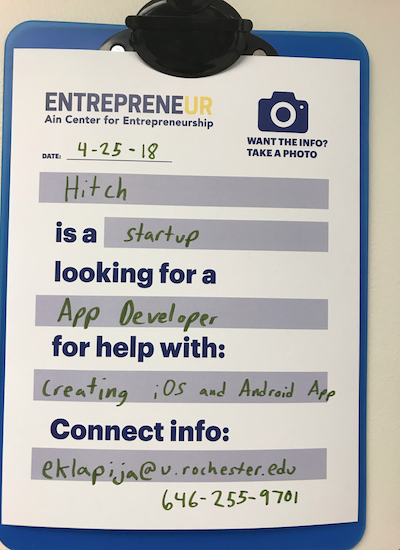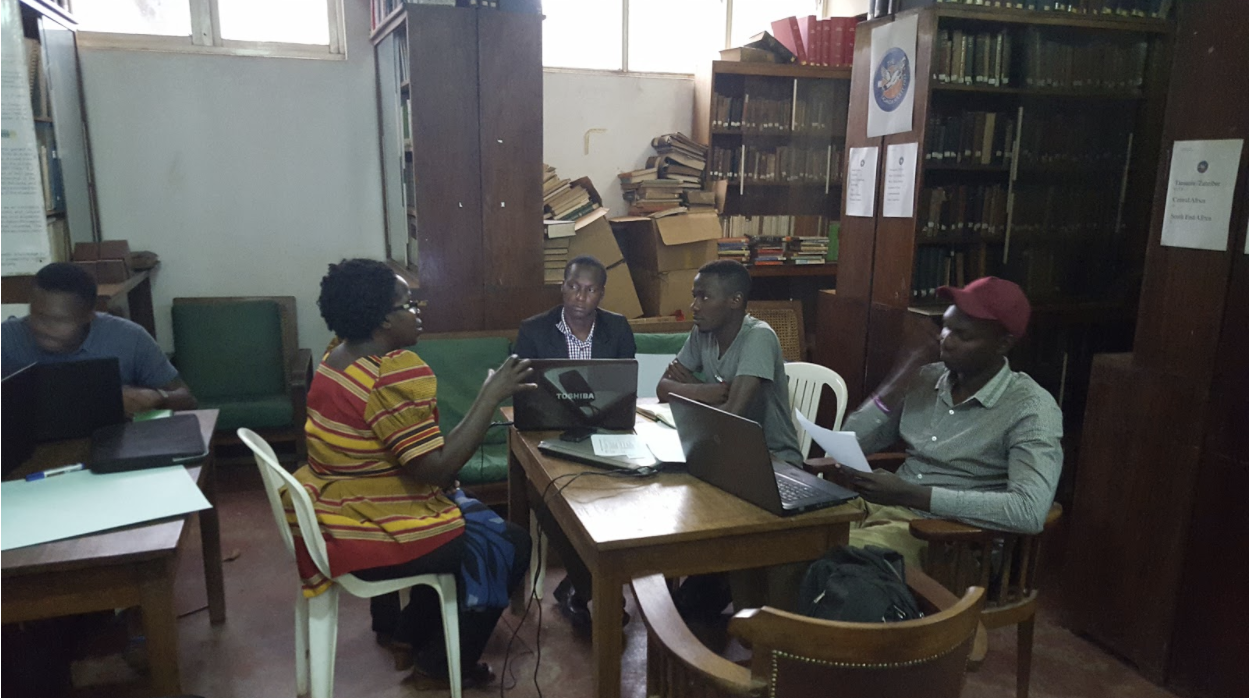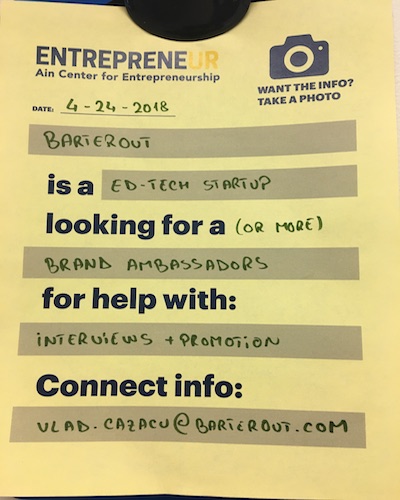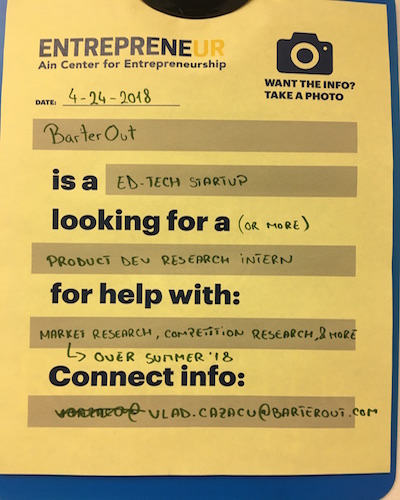Fulbright-RAF Scholar’s Experience at U of R
Each fall, the Ain Center welcomes visiting faculty from Romania to explore entrepreneurship. Vladimir Tanasiev, a member of the 2017 cohort, explains how his time at the University of Rochester inspired new ideas and fruitful partnerships.
Fulbright-RAF Scholar’s
Experience at U of R
Via the Fulbright-RAF Scholar Award program, I had the opportunity, together with another five Romanian professors, to study Entrepreneurship at the University of Rochester. Although is difficult to sum up my whole experience, I will try to convey the essence of it. Entrepreneurial culture in the United States is growing and channeled around universities, with the support of the entrepreneurship centers. I have clearly understood that there are numerous possibilities to support entrepreneurship and it takes time to get the best results – success doesn’t come overnight.

I noticed that USA universities make considerable efforts – both human and financial – to help students think in terms of entrepreneurship, playing in this respect a crucial role in developing the entrepreneurship culture. This continuous effort is strengthened through countless events dedicated to technical, transversal and social topics, contests, debates with investors, etc. The atmosphere created at the university, around students not only helps them to use their imagination, but also offers them the support for turning their ideas into products or services with economic potential. Life on campus is also quite different from my experience back home. During the whole semester, the students are involved, alongside the theoretical and practical classes, in activities aimed at personal and professional development and networking.
One question I have come across quite often was “Can entrepreneurship be taught?”. And the answer is yes, it can be taught, but it’s difficult to measure its impact. An entrepreneur can follow this path only when he feels prepared and this decision can take time. I have also learned that many of the success stories are paved with the determination of those who faced several failures before. To understand the entrepreneurial ecosystem built around the university is one aspect of the problem, but in order to understand its mission and ways to develop, you need guidance. I will take this opportunity to express my sincere gratitude to my mentors, Dennis Kessler and Duncan Moore, who helped me understand how entrepreneurship is cultivated and how it could be institutionalized. Furthermore, whether I was talking to a salesman at the weekly fair or to a university professor, I could always notice the kindness of the people. I had the same feeling when I was talking to colleagues from other universities and many others. During my whole stay I met nice and hospitable people, interested in our culture and open to future collaborations. Additionally, I really enjoyed meeting members of the Romanian community from Rochester who helped me and my colleagues adapt smoothly from the very start.
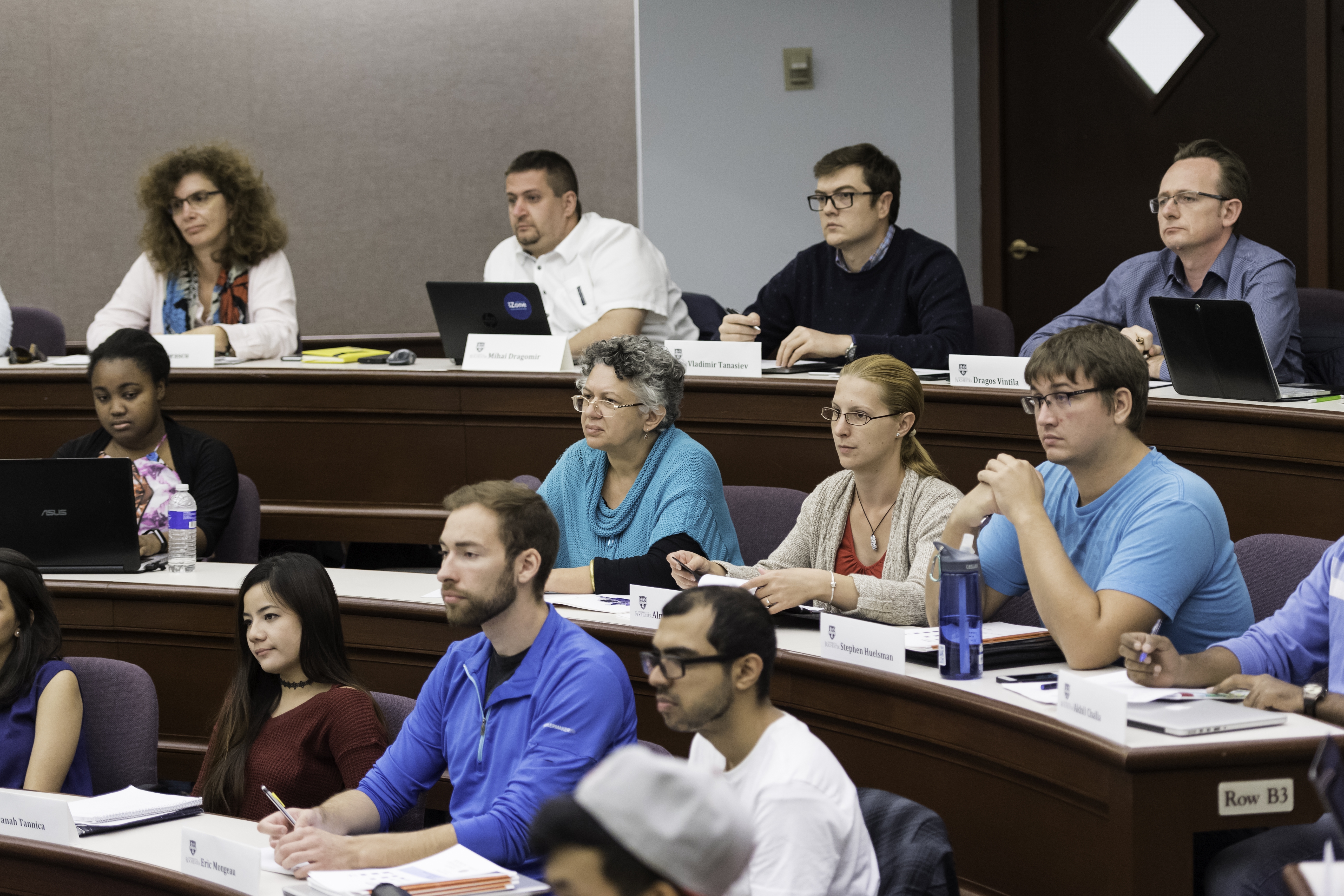
During my professional or leisure trips, I had the opportunity to discover the beauty of the USA, equally present in large cities, small towns and its national parks. These trips offered my colleagues – Dragos Vintila, Mihai Dragomir, Anca Nicolau, Corina Forascu, Alma Pentescu – and myself the context to get to know each other better, to become friends and to work together on future plans.
Vladimir Tanasiev was one of six Romanian professors in 2017 to receive a Fulbright-RAF research grant to learn about entrepreneurship at the University of Rochester. Tanasiev is an Assistant Professor within the faculty of Power Engineering at the University Politehnica of Bucharest, Romania. His Fulbright-RAF experience allowed him to develop an action plan to insert entrepreneurship into his projects, as well as to reflect on how he can help entrepreneurship flourish in Romania.
Talent Nyumbani: A Social-Driven Project to Grow Africa’s Talent
In 2016, undergrad Joshua “Dewey” Bazirake ’20 founded Talent Nyumbani, a social non-profit organization in Kampala, Uganda. Talent Nyumbani aims to highlight and develop youth talent, while also promoting innovations in the arts and sciences.
Talent Nyumbani:
A Social-Driven Project to Grow Africa’s Talent
By Joshua “Dewey” Bazirake
As a college student, with all of the assignments, course loads, and social life demands, how can you grow your entrepreneurial spirit and pursue the project of your dreams?
Talent Nyumbani is a social non-profit organization that I founded in Kampala, Uganda before arriving at the University of Rochester in 2016. This organization aims to bring out the best in the youth of Uganda. We continue to promote and showcase talents, as well as innovations in science and technology, art and photography, dance and music, and poetry and rap.
On a flight back home from United World College in Costa Rica, I was highly energized and motivated to start a new venture that would create impact in my home country. I first thought about setting up a house party for friends and charging a fee, but this idea was flawed. What value was I was creating for my peers in Uganda? As I thought deeper about it, I referred to a book that I pleaded with my brother to get me. This was The Personal MBA by Josh Kaufman, a concise guide on how to start and manage a successful business. The first chapter was about ‘value creation’, an element that gave purpose to a business. As I assessed my background & surroundings, I began to wonder why some students who were smarter than me in class weren’t recognized for their creativity and skills. I realized that there was a gap in giving opportunities to the youth and young people lacked an avenue to share their unique talents. From that moment, I knew that I wanted to create a “house party” that empowered the youth to bring out the best of who they are; this is where the idea of Talent Nyumbani stemmed from.The literal translation of “Talent Nyumbani” in Swahili means the house with talents – a welcoming place for youth to explore, discover, and share their talents.

BUILDING A TEAM
In the summer of 2016, I set out on an “undercover” search for the dream team: a team that displayed passion and a zeal for success. The quest to find the right team members is cumbersome, but the outcome of a great team who shares your vision is invaluable. A common saying in the startup scene is, “ you would rather have a bad idea and a good team as opposed to a good idea and a bad team.” The team I found was able to share, criticize and objectively make decisions which steered Talent Nyumbani in the direction it is today.
Now and again, there are disappointments that arise with the expectations you have with some of the team members. An example is I found some team members interested in short term gains and quick profits. I approached the situation by being observant rather than judgmental to objectively identify the strengths and weaknesses of each team member. In the end, an entrepreneur retains the team members who add the most value to the project and passionately driven to achieve the mission/vision.
MAKING IT HAPPEN
Our first event took place in July, 2016. My original idea was to have a month-long event with different activities on each day (such as workshops, performances and networking sessions). With advice from my team, we pivoted to a shorter period of one week. The first day was terrifying as we barely got any attendees. Painters and photographers came to display their work but no one had come to view it.
Was this a failure?
Had I wasted all my time and effort on something that wasn’t needed?
Resiliently, we waited for turn out. Over the course of the week, we had an increase in the number of attendees which boosted our confidence and, with appreciation for the idea, our team saw the need to hold a second event.
The second event was held on January 12, 2018. This event was a success with a turn out of 170 individuals, more than 100% increase from the last event. We also incorporated a hackathon that brought rise to technological ideas with a potential to disrupt the agricultural sector in Uganda. We had more partners on board this time such as the University of Rochester, Outbox Uganda, Innovation Village, FundiBotz, amongst others. This event was also graced by the presence of Dr. Elioda Tumwesigye, the Minister of Science, Technology and Innovation in Uganda.

DEALING WITH FAILURE
Failure is common when it comes to startups and it comes in so many forms: failure to secure funding, failure to get the team to agree on a particular direction to take, failure to get the right location and failure with the idea itself. For Talent Nyumbani, my goal of creating an open house seemed impossible to achieve when I failed to get a location and when we failed to advertise in time.
Day in and day out, I invested my time, effort and resources to make the impossible possible. I received feedback of all sorts, some saying that I didn’t have enough expertise to get the project going or that the idea wasn’t ready for a market like Uganda. The process of starting from an idea and working towards a finished product is what builds an entrepreneur through failure and continuous progress. The best way to deal with failure is by being calm in the most difficult situations, understanding the root cause of a problem and crafting solutions together as a team. Without the support structure of your team, a leader is destined for failure. Whenever an issue arose, I’d gather the team and we’d tackle the problem together. Each team member had a unique contribution and perspective. Problem solving requires robust brainstorming and immediate action in order to mitigate any future challenges. In the end, we encountered financial, logistical, management and service delivery problems. However, we conquered these because of our team spirit and vision for the project.

WHAT’S NEXT?
When starting up, it is advised to have the long-term vision in mind. We are currently working on improving our presence online in order to be more accessible to other youth in Uganda and surrounding neighbouring countries. It is our intention to conduct regular events at high schools and universities around Uganda in the upcoming year. With the growing partnerships we create, we are incorporating mentorship, skills development and outsourcing internships. We welcome anyone who is interested in empowering the youth and solving the issue of unemployment in developing countries.
Our long-term vision is to bring out the most outstanding talent in Africa and share it with the rest of the world.
Joshua “Dewey” Bazirake is a member of the class of 2020, studying Financial Economics. During his first year at UR, Bazirake founded Kwetu, a student organization dedicated to promoting and encouraging entrepreneurship and development on the African continent. Recently, Kwetu co-hosted the inaugural Africa Business Conference with Simon Business School. Bazirake has also participated in the NSF I-Corps Site grant and training program, to learn how to conduct customer discovery in his efforts to commercialize and idea to harness data to streamline group travel.

